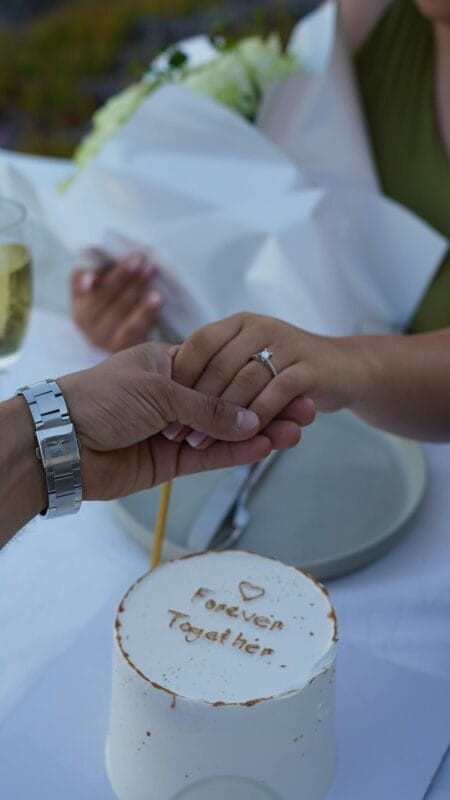Who Gets the Engagement Ring in a Divorce? A Completed Guide for New York and Pennsylvania
Divorce often involves dividing assets and property, and one of the most frequently asked questions is about the fate of the engagement ring. While it may seem like a straightforward matter, the engagement ring’s ownership can become a complicated issue in some cases, especially when legal considerations vary between states. If you’re going through a divorce in New York or Pennsylvania, it’s essential to understand how the law views engagement rings and the factors that can influence who gets to keep the ring.
This article provides a detailed analysis of how engagement rings are treated in divorce cases in New York and Pennsylvania. It covers legal principles, factors that impact decisions, common disputes, and answers to frequently asked questions (FAQs) to help guide you through this challenging situation.
Table of Contents
Understanding the Legal Nature of Engagement Rings
Before delving into who gets the engagement ring during a divorce, it’s important to first understand its legal status.
What Is an Engagement Ring?
An engagement ring is traditionally a gift given by one partner to another as a symbol of commitment before marriage. In most cases, the ring is intended to be a gesture of love and an indication of the promise to marry.
However, in legal terms, the engagement ring is often viewed as a gift. The classification of the ring as a gift or an item of property plays a significant role in how it is treated in a divorce settlement.
Gift vs. Property: Legal Distinctions
Gift: A gift is defined as something given without expectation of return. In the case of an engagement ring, if it is considered a gift, the recipient (the person receiving the ring) may have the right to keep it, even if the marriage ends.
Property: In contrast, property is subject to division during divorce. In some states, if the engagement ring is considered marital property, it may be subject to division during the divorce proceedings.
Engagement Rings in Divorce: General Legal Considerations
In divorce cases, the treatment of engagement rings varies depending on the state law, the circumstances surrounding the gift, and the nature of the divorce itself. Several key principles typically apply:
Ownership: In most cases, the person receiving the engagement ring is presumed to be its rightful owner. However, this can change if there are legal or financial complications that require a different outcome.
Marital Property: If the ring was acquired during the marriage and is considered marital property, it could be subject to division. However, if the ring was given before the marriage (as is typical), it is usually not treated as marital property.

Fault vs. no-fault divorce: Some states consider the reason for the divorce when dividing assets. If one spouse is found to be at fault (e.g., due to infidelity or misconduct), it might influence how property, including an engagement ring, is divided.
Engagement Ring as a Gift in Divorce
In most cases, courts regard the engagement ring as a gift. As such, it is typically not considered marital property, especially in no-fault divorce states. However, this is not always the case, and the specific facts of the divorce can influence the outcome.
Who gets the engagement ring in a divorce in New York?
New York follows the general principle that an engagement ring is considered a gift, and as such, the recipient of the ring typically retains ownership in the event of a divorce.
Engagement Ring as a Gift
New York Law: In New York, an engagement ring is generally considered a gift, not marital property. The person who receives the ring (usually the bride) is entitled to keep it after the marriage ends.
Pre-Marriage: Since the engagement ring is typically given before the wedding, it is not considered property acquired during the marriage and, therefore, is not subject to division in divorce proceedings.
Fault and No-Fault Divorce: New York is a no-fault divorce state, meaning the reason for the divorce (e.g., infidelity, misconduct) does not usually influence the division of property, including the engagement ring.
However, there are exceptions:
If the Engagement Ring Is a Marital Asset: In rare cases, if the ring was bought during the marriage or if it was purchased jointly with marital funds, a court might rule that the ring is marital property and order its division.
Ring’s Value: If the engagement ring is of high value and there are significant disputes over its ownership, the court may decide that the ring should be treated like any other marital asset.
Who Gets the Engagement Ring in a Divorce in Pennsylvania?
Pennsylvania has its own set of rules when it comes to the division of engagement rings in a divorce.
Engagement Ring as a Gift
Pennsylvania Law: Like New York, Pennsylvania generally treats the engagement ring as a gift. As a gift, it is typically considered the property of the person who received it (the recipient).

Pre-Marriage Consideration: Engagement rings are usually given before the marriage takes place. As such, they are typically not considered part of the marital estate, and the recipient keeps the ring after a divorce.
Fault and No-Fault Divorce: Pennsylvania is also a no-fault divorce state. The reason for the divorce typically does not impact who gets to keep the engagement ring. Whether the divorce is due to infidelity, abandonment, or another issue, the recipient of the ring is usually entitled to keep it.
Exceptions in Pennsylvania
Marital Property: If the engagement ring was purchased during the marriage or with joint funds, it could be considered marital property and divided accordingly.
Negotiated Settlements: In some cases, couples may negotiate an agreement that dictates the engagement ring’s ownership as part of their settlement.
Factors That Impact the Decision on the Engagement Ring
Several factors can influence who gets the engagement ring during a divorce in New York and Pennsylvania. These include:
The Ring’s Value
High-value rings (e.g., expensive diamonds or unique designer rings) are more likely to be involved in disputes. The greater the value of the ring, the more likely it is that the parties will contest who gets to keep it.
Marital vs. Separate Property
Marital Property: If the engagement ring was purchased during the marriage or with marital funds, it may be subject to division.
Separate Property: If the engagement ring was given before the marriage, it is generally considered separate property and not subject to division.
Fault in the Divorce
Some states take fault into consideration when dividing property, although New York and Pennsylvania generally do not. However, in rare instances, fault might influence the division of assets, including the engagement ring.
Common Disputes Involving the Engagement Ring
While many divorce cases resolve amicably, engagement rings can be a point of contention. Some common issues include:
Who Bought the Ring?
If the engagement ring was purchased with separate funds (e.g., from one spouse’s inheritance or personal savings), it could be considered separate property and not subject to division. Disputes arise if the origin of the funds is unclear.
Who Gave the Ring?

Although engagement rings are typically given as gifts, some people might argue that the ring should be returned if the marriage did not take place or if the marriage ended due to a specific reason (e.g., infidelity).
Sentimental Value
For some, the engagement ring holds significant sentimental value. If one spouse is deeply attached to the ring, it can lead to emotional disputes and further complications in the divorce process.
FAQs
Q1: Can I get my engagement ring back in a divorce?
A1: In most cases, if the engagement ring is considered a gift, you will not be entitled to get it back after a divorce. However, if the ring was purchased during the marriage with joint funds or if it is deemed marital property, it may be subject to division.
Q2: Is the engagement ring considered marital property?
A2: Generally, engagement rings are considered separate property, as they are given before the marriage. However, if the ring was purchased during the marriage or with joint funds, it may be considered marital property and divided accordingly.
Q3: What if my spouse gave me an engagement ring but we never married?
A3: If the engagement was called off and the marriage did not occur, the engagement ring is generally considered a gift. In such cases, the recipient of the ring usually gets to keep it, though disputes can still arise.
Conclusion
The fate of the engagement ring in a divorce can depend on several factors, including the state you live in, the ring’s value, and the circumstances surrounding the gift. In New York and Pennsylvania, engagement rings are generally treated as gifts and are not considered marital property, so the person who received the ring typically keeps it. However, exceptions exist, especially if the ring was purchased with marital funds or if there are disputes over its value.
Understanding how your state handles the division of engagement rings and discussing your specific situation with an attorney can help clarify what you can expect during your divorce. While the engagement ring may hold emotional significance, its legal treatment during a divorce is guided by state laws and property classifications, so it’s important to know your rights and options.

